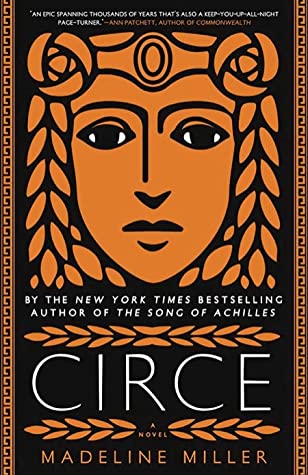Title: Circe
Author: Madeline Miller
Released: April 10, 2018 (Hardcover)
Series: N/A
Trigger Warnings: Body horror, childbirth (with complications), rape, torture
Rating: ★★★★★
Description: In the house of Helios, god of the sun and mightiest of the Titans, a daughter is born. But Circe is a strange child – not powerful, like her father, nor viciously alluring like her mother. Turning to the world of mortals for companionship, she discovers that she does possess power – the power of witchcraft, which can transform rivals into monsters and menace the gods themselves.
Threatened, Zeus banishes her to a deserted island, where she hones her occult craft, tames wild beasts and crosses paths with many of the most famous figures in all of mythology, including the Minotaur, Daedalus, and his doomed son Icarus, the murderous Medea, and, of course, wily Odysseus.
But there is danger, too, for a woman who stands alone, and Circe unwittingly draws the wrath of both men and gods, ultimately finding herself pitted against one of the most terrifying and vengeful of the Olympians. To protect what she loves most, Circe must summon all her strength and choose, once and for all, whether she belongs with the gods she is born from, or the mortals she has come to love.
Please keep in mind that this review contains spoilers for the entire book. Read with caution. If you click on “Read More”, it is under the assumption you either don’t care about spoilers or you’ve already read the book.
This has been on the back burner for a long time for me because regardless of whoever it’s written, there’s something fucked up that makes it hard for me to read. Unfortunately, that’s the nature of the myths of the Greeks, when it comes to female characters so that’s one of the reasons why it took me so long to do so.
But… Circe was more than just another survivor and, more importantly, a plot point for Odysseus in The Odyssey. I think when it comes to writing about a myth, there’s a line to tow; how much is too much? How technical is too technical?
At which point does historical fiction become fiction when it comes to telling the facts? I do think that some readers would be turned off by how technical it is compared to Song of Achilles which arguably had some of the best lyrical prose writing I’ve ever read. That isn’t to say this book is worse because it certainly isn’t – this novel gave life to a Titan who I’ve only heard in passing in learning about witchcraft or the Odyssey.
Though extremely technical, Circe’s voice was not only strong but beautiful. I think this book made me cry multiple times because of all the abuse she had to endure from her family, from random strangers, and even the men she loved deeply in her eternal life. I will say that it’s good that Madeline did the best thing in regard to her rapes it’s not detailed and not without an in-narrative warning. I think the technicalities though are understandable considering that at every point Circe did (and didn’t do) she was punished. And even if she was an “unliked” Titan, she had a tone of voice that’s distinctive and I think that’s the most important factor to consider.
Though, I did like seeing other mythos and people from their own stories pop in here and there (shout out to Medea) so at least it wasn’t boring. I was most worried about what was going to happen in between meeting the other myths and legends (especially making the Olympic deities as grey as possible) and what was going to be done in the end. But it’s a lot more engaging than I had anticipated especially since there are long stretches of time where she would have been waiting.
But one thing I didn’t expect was the development of Penelope and Telemachus to be as intrinsic as it was. I’m not complaining; I had always wondered what happened at the end of the Odyssey and after Odysseus had returned to his place in Ithaca and this gave me a satisfying answer. Plus, Odysseus was a piece of shit which is another thing that I enjoyed in the book to see.
Not because I had secretly harbored resentment towards him or always thought one way, really – it makes him more of a man who suffered through thirteen years of travel to even get HOME, much less the Trojan War. I’m glad that the book did say that it is quite a complicated situation between how a man like Odysseus would be compared to Penelope, Telemachus, and even Circe herself. Not exactly demonizing him, because there had to be some good points of him, but at the end of the day, Odysseus had always followed his own path, and whether or not they wanted to go along for the ride on his glory.
But this isn’t about him. If anything, I’m glad that his final arc was driven home to Circe just how miserable immortality can be, especially since she’s cursed with such an awful family and, honestly, suffering through something she should have never gone through. This book gave me a whole new appreciation for her and I think I’ll thank her whenever I practice some witchcraft.

